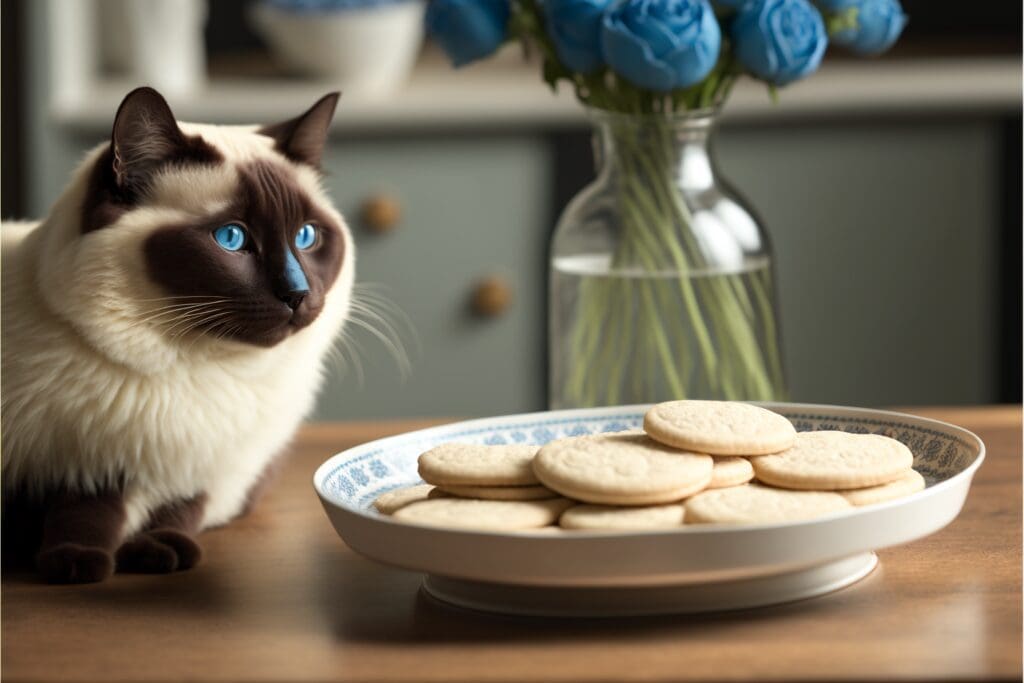Last Updated on January 8, 2023 by admin
No, cats cannot eat sugar cookies. While cats are obligate carnivores and cannot taste sweet, it does not make sugar cookies suitable for them. Sugar cookies are full of refined carbohydrates that can lead to obesity. Even a small nibble of a cookie could cause pancreatitis in cats. It is best to avoid feeding them cookies altogether and stick to foods that are specifically designed for cats.
Understand the Risks of Feeding Cats Sugar
It is important to understand the risks associated with feeding cats sugar. Sugar can be dangerous for cats as they cannot digest it efficiently. Eating sugar can lead to vomiting, diarrhea, and discomfort in cats. It’s also important to understand that cats cannot taste sweet, so feeding them plain sugar cookies is not an option. This means that if your cat does eat a sugar cookie, they could be at risk for developing pancreatitis due to the large amounts of sugar and fat in the cookie. Additionally, too much sugar can lead to weight gain in cats, making them more susceptible to health issues such as diabetes.
Know the Dangers of Too Much Sugar
It’s important to note that while cats can metabolize sugar, they cannot digest it efficiently and too much can lead to serious health issues. Eating too much sugar can cause cats to develop pancreatitis, a painful and potentially life-threatening condition. Other health risks associated with excessive sugar consumption in cats include weight gain, diabetes, and dental problems. It is in your pet’s best interest to avoid sugar whenever possible, even if it is found in treats specifically designed for cats.
Be Cautious When Feeding Cats Homemade Sugar Cookies
When it comes to homemade sugar cookies, it’s important to be extra cautious. Many recipes include ingredients that can be toxic to cats, such as raisins, chocolate chips, nuts, and butter. These can cause digestive issues and even kidney failure if ingested. If you must give your cat a homemade sugar cookie, make sure that the recipe you use doesn’t contain any of these ingredients. Additionally, it’s important to keep in mind that cats cannot taste sweet, so there is no nutritional benefit for them in eating these cookies.
Avoid Sugar Free Sugar Cookies
It’s important to avoid giving cats sugar-free cookies, as these can contain sugar-replacement sweeteners that are toxic to cats. Artificial sweeteners like xylitol, sorbitol, mannitol, and maltitol can be found in sugar-free cookies, and they can cause liver failure and hypoglycemia in cats. If you’re looking for a special treat for your cat, choose a treat specifically made for cats with no added sweeteners or sugars.
Can Cats Become Diabetic from Eating Sugary Human Foods?
While cats may not develop diabetes from eating sugar cookies, feeding them excessive amounts of sugar can still have negative effects on their health. Overfeeding cats sugary treats can lead to obesity, which can increase their risk of developing diabetes. In addition, sugar can contribute to other medical issues such as liver disease and dental problems. If you are going to give your cat a sugar cookie, be sure to stick to an occasional treat and keep the portions small. Additionally, it is important to monitor your cat’s weight to ensure they stay at a healthy level.
What Are the Challenges of Having a Cat with Diabetes?
Having a cat with diabetes can be a challenging experience for both the cat and their owners. Diabetes mellitus, the inability to produce enough insulin to balance blood sugar levels, can lead to weight loss, loss of appetite, vomiting, dehydration, depression, problems with motor function, coma, and even death if left untreated. Prolonged use of steroids, obesity, and age are all risk factors for developing diabetes in cats. Many cats with diabetes can be difficult to control, often requiring high doses of insulin administration. This may be due to owner noncompliance or other health issues such as weakness in the hind legs. Diabetes can be split into two main types, Type I and Type II, with cats almost exclusively suffering from Type II. Symptoms of feline diabetes include increased thirst and appetite, excessive urination, lethargy and weight loss. Owners of cats with diabetes must be committed to providing attentive care and monitoring for their pets to ensure a healthy and happy life.
